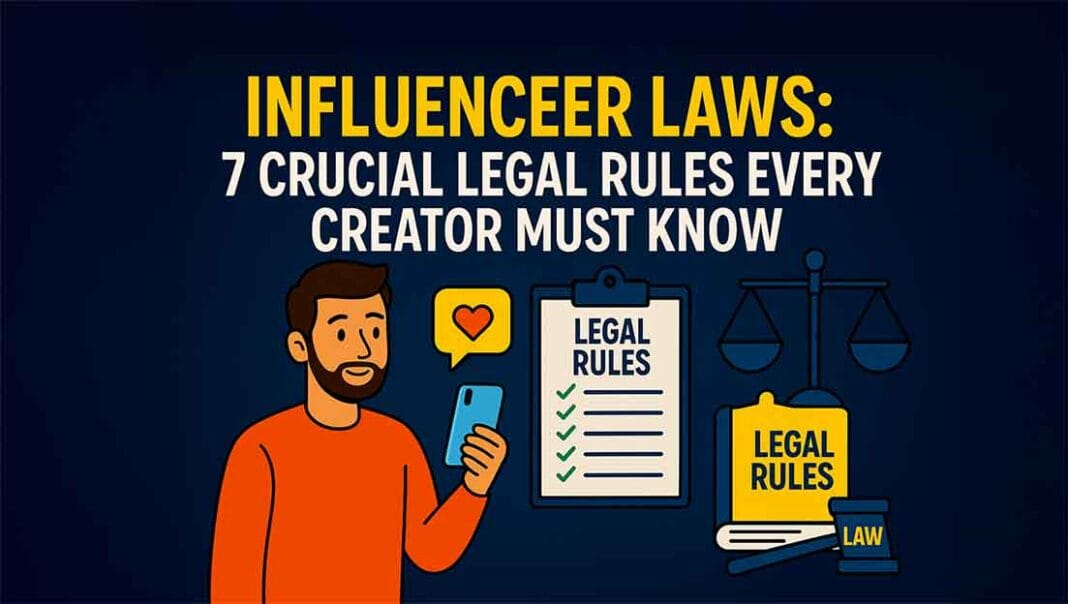The Legal Guide Every Influencer Needs in 2025
The rise of the influencer economy has been nothing short of explosive. Whether you’re promoting skincare on Instagram, unboxing gadgets on YouTube, or going viral with Reels, being an influencer is now a legitimate (and often lucrative) profession.
But with great influence comes… a legal responsibility most creators overlook.
From misleading endorsements to unregistered businesses, many influencers are unknowingly violating laws—and that can lead to fines, bans, or even lawsuits.
Let’s fix that.
In this guide, we break down the 7 essential laws influencers must know to stay compliant, credible, and legally protected in India.
Also Read: Starting Business in India? 10 Legal Must-Knows for Every Entrepreneur
1. Disclosure Rules Under Advertising Standards
If you’re promoting a product or brand—even subtly—you must disclose it clearly. The Advertising Standards Council of India (ASCI) guidelines, updated in 2021, now require every influencer to add visible and understandable disclaimers.
What You Must Do:
Use clear labels: #Ad, #Sponsored, #PaidPartnership
Put the disclosure at the beginning of the post or caption.
Verbal disclosure required in videos (e.g., “This video is sponsored by…”).
💡 Example: Promoting a clothing brand? A “Thanks to XYZ for the outfit” won’t cut it. You must explicitly say it’s a paid collaboration.
2. Consumer Protection Act, 2019
Under this act, influencers are now considered part of the supply chain when endorsing products. That means you’re legally liable if your promotion is misleading, false, or unsubstantiated.
Real-Life Scenario:
If you promote a skincare product claiming “instant glow in 5 minutes” and a user suffers a reaction, you can be held accountable—even if you didn’t make the product.
📌 Tip: Don’t blindly promote products. Ask brands for evidence, and review products honestly.
3. Income Tax Laws for Influencers
Yes, your brand deals, affiliate income, barter collaborations, and even free gifts are taxable.
Tax Rules to Know:
You must declare all income, including freebies (they’re valued and taxed).
Consider registering as a sole proprietorship or LLP for better tax planning.
File ITR (Income Tax Return) annually under appropriate heads—usually “Profits and Gains from Business or Profession.”
📊 Pro Tip: Maintain invoices, brand contracts, and transaction records. Tools like QuickBooks or Zoho Books can simplify this.
Read more: Pride Month 2025: 7 Bold Legal Milestones Shaping LGBTQ+ Rights in India
4. Goods and Services Tax (GST) Applicability
If your annual income exceeds ₹20 lakhs (₹10 lakhs in some states), you must register for GST.
What That Means:
You’ll charge 18% GST on services provided to brands (yes, even for content creation).
You can claim input tax credit on business expenses.
Late registration can lead to penalties and backdated dues.
📌 Example: Collaborating with a national brand and charging ₹1.5 lakh? Add GST if registered.
5. Intellectual Property (IP) Rights for Influencers
Your content is your asset—but so is everyone else’s. Both protecting your own IP and avoiding IP violations are crucial.
Key IP Rules:
Trademark your influencer name if it’s a brand (e.g., @StyledByAnya™).
Don’t use copyrighted music, images, or logos without permission.
Respect fair use limits in parodies or commentary.
🎧 Real-Life Mistake: Using trending music in a monetized YouTube video without a license can lead to copyright strikes or demonetization.
6. IT Rules, 2021 – Digital Media Compliance
The Indian government now classifies influencers with large audiences as digital publishers, especially if you distribute content on a regular basis.
What to Note:
You’re expected to avoid obscene, defamatory, or fake news-like content.
Platforms must act on complaints, but you can also be named in FIRs for objectionable content.
Be cautious with political, religious, or health-related content.
⚠️ Posting “miracle cures” or triggering content without disclaimers can attract legal action under Section 69A of the IT Act.
Read More: Live-in Relationships in India: Legal Rights You Must Know (2025 Update)
7. Contract Law: Know Before You Sign
Brand deals, agency partnerships, and even collaborations with other creators should be backed by proper contracts.
What to Check:
Payment timelines and cancellation clauses
Content usage rights (Can they reuse your content indefinitely?)
Non-compete and exclusivity clauses
Legal Tip: Always retain rights to your original content and set limits on brand usage.
📄 Pro Tip: Use standard influencer contract templates or consult a lawyer before signing high-value deals.
Bonus: Influencers and Cyber Laws
As a public figure, you’re also more vulnerable to online trolling, hacking, and impersonation.
Protect yourself:
Enable 2FA on all social platforms
Register a cyberbullying complaint with the local cyber cell if harassed
Report fake accounts impersonating you immediately
👉 You’re protected under the Information Technology Act, 2000, and sections of the IPC dealing with cybercrime.
Summary of Influencer Laws You Must Know
ASCI Disclosure Rules | Always disclose paid content clearly |
Consumer Protection Act | Be honest and responsible in promotions |
Income Tax Laws | Declare all earnings—including gifts |
GST Compliance | Register and charge GST if eligible |
IP Laws | Don’t infringe; protect your own brand |
IT Rules | Avoid misinformation and offensive content |
Contract Law | Always have a written agreement |
Influence Responsibly
Being an influencer is more than posting great content. It’s running a personal brand that’s now governed by the law. Staying legally compliant not only protects your income but also builds trust with your followers and brands.
✅ Don’t leave your career vulnerable to a legal blind spot.
✅ Learn, adapt, and grow—legally.
Also read: Can the Police Check Your Phone Without Permission? 7 Key Facts 2025


